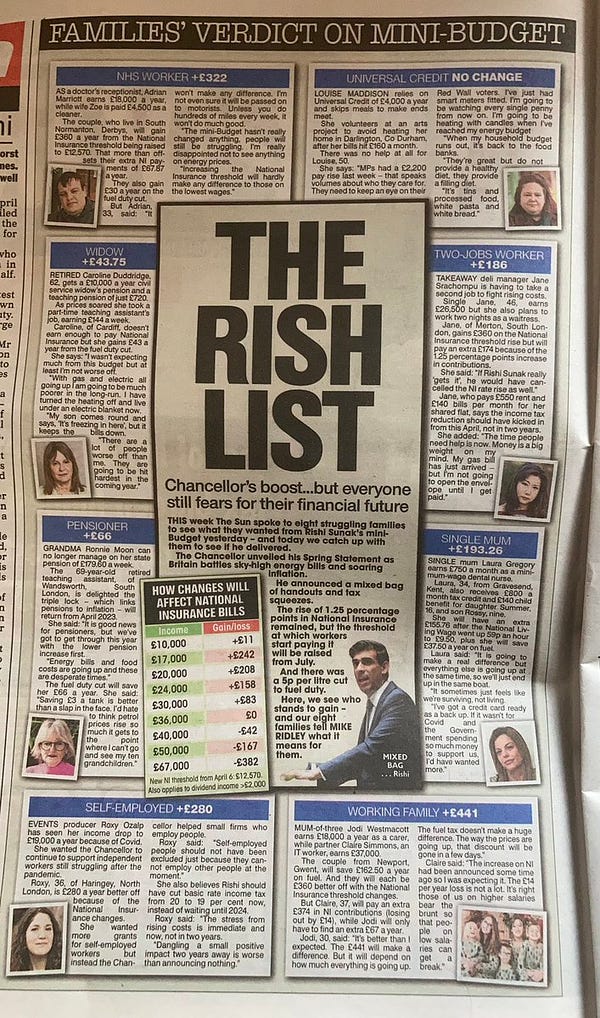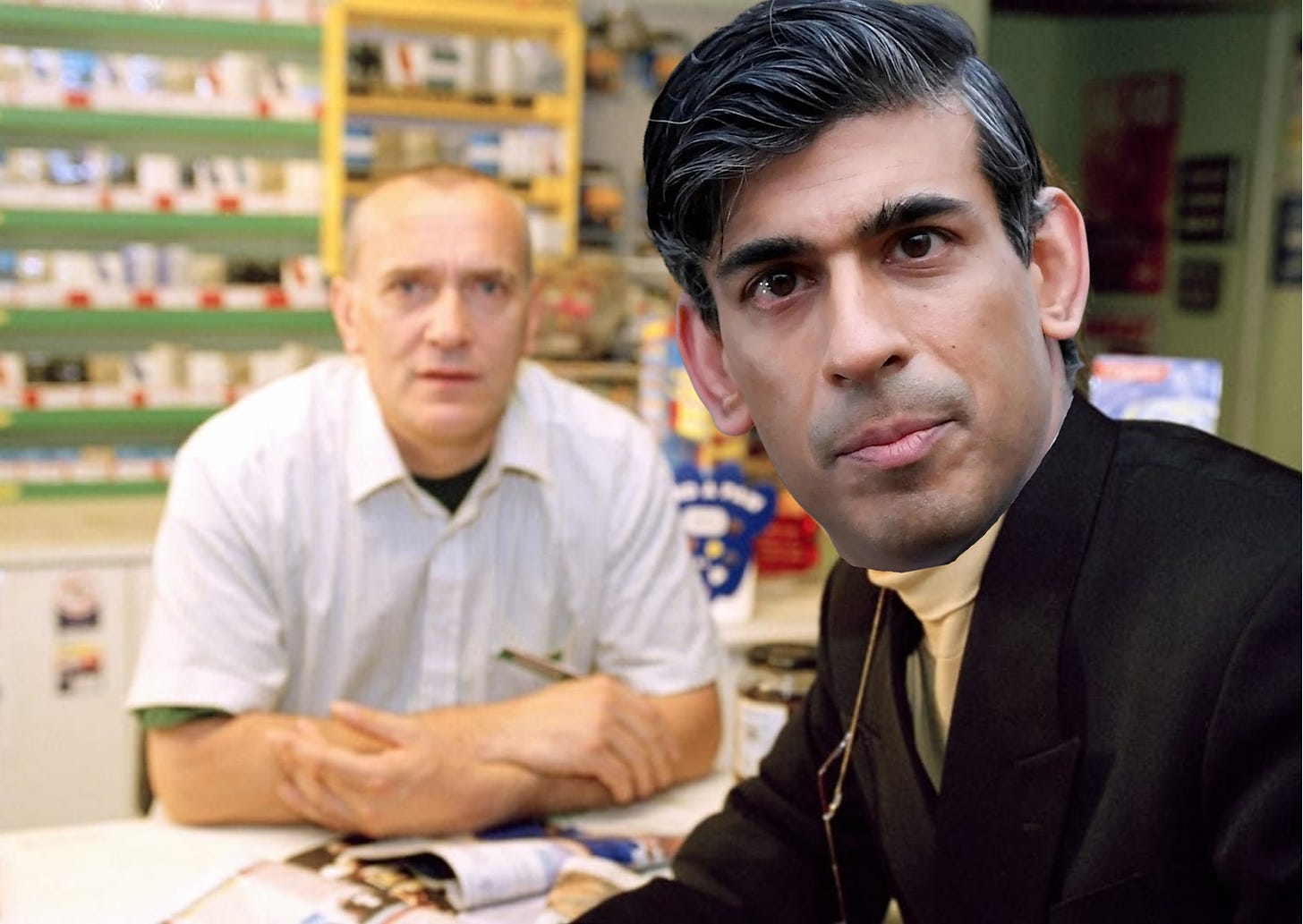Sometimes a blunt comparison between headlines is revealing. Today’s Times front-page says Biggest fall in living standards since 1950s while The Sun slots its spring statement headline in the top left (Rishi Tax Gain But Still Pain) subordinate to a spurious splash that Vladimir Putin might bid for Euro 2028.
Sun readers are told by its Political Editor, Harry Cole, that…
Rishi Sunak’s Spring Statement yesterday spared more than two-thirds of workers from the National Insurance rise and vowed to cut a penny off income tax by 2024. But Brits still face the biggest fall in living standards since records began.
Inside, a boxout by Sun columnist Trevor Kavanagh telegraphs a big reason the paper is straining so hard to go easy on the chancellor. He writes:
Full marks to Rishi Sunak for the 5p VAT fuel duty cut urged by The Sun…
Elsewhere on the same spread, the paper prints the logo of its ‘Keep It Down’ campaign to hammer home the message:
“That fuel duty cut? It was The Sun wot won it.”
While Kavanagh’s analysis is blunt — he dismisses the measures as “a budget of smoke and mirrors” — Cole, still reliant on government patronage, runs treasury lines verbatim in his story and grabs credit for The Sun again:
[Sunak’s] 5p fuel duty cut… was a major victory for The Sun’s 12-year Keep It Down Campaign. It will save motorists around £3.30 every time they fill up.
A superficial reading of the paper’s leader column (2 Cheers Rishi), which again talks up its role in the fuel duty cut and concludes by saying, “Sorry Rishi. We’re not convinced it’s the election-clinching move you think it is”, might lead you to conclude that it’s being critical.
But the overall tone is that Sunak had no choice and, while the leader serves as a whispered threat that the paper might not support the Tories at the next election if there aren’t further tax cuts, it makes sure to claim:
Labour wants voters to believe that Mr Sunak, like all Tory chancellors, sits on a vast pile of gold he cruelly refuses to hand out. The truth is that he faces nightmarish economic headwinds.
There’s so much ideology coming off that paragraph you could huff the fumes for a powerful headrush.


On the same page, the paper collects together vox-pops from 8 families who it says have either benefitted from or been unaffected by Sunak’s announcement. It has clearly cherry-picked the testimonials but beneath each headline figure (“NHS worker +£322”, “Widow +£43.75”) each is a story of struggling.
The Sun has structured the page that way in the hope that readers will only look at the headings and skim over the copy. It avoids showing its working and it’s impossible to take the “gains” seriously when Caroline Duddridge, the widow it says is £43.75 better off — such largesse! — says:
With gas and electric all going up, I’m going to be much poorer in the long run.
While Sun readers get just three pages of heavily-spun coverage, The Times dedicates 5 news pages and 3 pages in the business section to the statement. The spin is still there but it’s just applied a little more subtly.
The front-page story opens by saying that Sunak “attempted to assert his credentials as a tax-cutting chancellor” and only includes the thoughts of the Office for Budget Responsibility, Tory ministers, and Paul Johnson, the head of the Institute of Fiscal Studies and a Times columnist, writing in the same paper. Labour’s lines are notably absent, perhaps because they’re practically indistinguishable from the government’s position.
Inside, its analysis (Sunak gears up for election with £30bn war chest) accepts that “Sunak… collecting his winnings from healthier public finances to build up a pre-election warchest of £30 billion to be unleashed before voters head to the ballot box” is somehow morally acceptable. The phrase “his winnings” is particularly choice, as if Sunak is a bloke on a fruit machine hot streak.
The Times’ case studies aren’t presented as an easy grid of “winners” but a boxout with pen portraits of figures ranging from a 32-year-old search engine consultant to a 52-year-old former training coordinator made redundant during the pandemic. In its own way, it’s as partial and deceptive as The Sun’s choices.
The headline of its story on changes to student loan repayments is telling — Student loan reform boosts coffers — given the age profile of its readership and a picture caption (“Rishi Sunak’s official photographer snapped him filling up his tank after the spring statement.”) shows how lazily official images are accepted. Rishi Sunak does not drive a Kia Rio and he’s the least comfortable man in a service station since Alan Partridge’s Linton Travel Tavern years.
The business section opens with a story about business leaders’1 views on the statement (“[a] ‘missed chance’ to rebuild Britain’s economy”) and Alastair Osborne’s business commentary column digs into the details to dismiss them as not “jam tomorrow” but “jiggery-pokery” today. He rightly notes:
It’s alarming, too, who Sunak’s going after to balance the books: students, with the chancellor earmarking £35 billion extra over six years from tougher loan repayment rules. Why them instead of the well-off?
It’s quite the contrast with the news section’s glib headline about a “boost to the coffers”. But the overall impression remains that The Times has, as Paul Johnson writes, “some sympathy for the chancellor”.
While The Sun and Times provide different prisms through which to see Sunak, the underlying argument remains the same. There is a general acceptance of the lines presented by the government.
Try this thought experiment: If it wasn’t a Tory chancellor presiding over this shit show, what would the coverage look like?
As loaded a term as “community leaders”.


